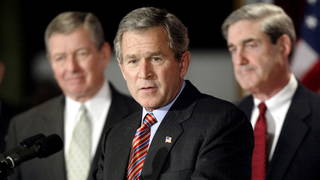
Topics
Guests
- Nat Hentoffauthor of the The War on the Bill of Rights and the Gathering Resistance and syndicated columnist who frequently writes on First Amendment issues for the Village Voice, Editor & Publisher and other publications.
The Supreme Court heard argument in two cases yesterday to determine whether the White House can detain US citizens indefinitely without ever having to press charges or allowing the citizen a chance to appeal their detainment in court. We hear excerpts of the oral arguments and speak with author and columnist Nat Hentoff.
The cases involve two U.S. citizens who have been held as enemy combatants, Jose Padilla and Yaser Esam Hamdi. Padilla, a US-citizen born in Brooklyn, was detained at Chicago’s O’Hare airport nearly two years ago for allegedly plotting to set off a dirty bomb. Hamdi is an American-born Saudi who was turned over to U.S. forces by the Northern Alliance in Afghanistan in 2001.
Both men have spent two years in military custody on a naval brig in South Carolina. They have never been charged with a crime and have been barred from seeing any evidence against them. They both had no access to a lawyer until recently when their attorneys were allowed to meet with them under supervision from Navy officials.
The justices indicated at the hearing yesterday that a central concern of the court is whether President Bush acted with sufficient authorization from Congress to declare citizens captured at home or abroad as “enemy combatants” and then hold them indefinitely, without criminal charges, for interrogation.
The justices yesterday seemed divided, with no clear majority view discernible from their questions and remarks.
This is an excerpt of Deputy Solicitor General Paul Clement’s opening argument in the case of Yaser Hamdi before the Supreme Court yesterday.
Transcript
AMY GOODMAN: This is an except of Deputy Solicitor General Paul Clement’s opening argument in the case of Yasser Hamdi before The Supreme Court yesterday.
PAUL CLEMENT: Petitioners contend that the government categorically lacks the authority to hold Hamdi as an enemy combatant. But it has been well and long established that the government has the authority to hold both unlawful enemy combatants and lawful prisoners of war captured on the battlefield in order to prevent them from returning to the battle. Over 10,000 United States troops remain on the field of battle in Afghanistan. No principle of law or logic requires The United States to release an individual from detention so that he can rejoin the battle against The United States.
AMY GOODMAN: That was an excerpt of Deputy Solicitor General Paul Clement’s opening argument before the Supreme Court. During the proceedings, Supreme Court Justice Sandra Day O’Connor asked Yassar Hamdi’s lawyer Frank Dunham if he felt Congress had given The President to take whatever action needed after 9/11 to fight the war on terror.
FRANK DUNHAM: The authorization for use military force does not have the word “detention” anywhere in it. It talks about use of force and it is the equivalent in our view, the declaration of war.
SANDRA DAY O’CONNOR: No, but look. It does say in this authorization, The President is authorized to use all necessary and appropriate force against persons he determines planned, authorized, committed or aided the terrorist attacks.
FRANK DUNHAM: If that is interpreted to mean that he can impose indefinite executive -detention on anybody that he thinks is necessary in order to fulfill that command, we could have people locked up all over the country tomorrow, without any due process, without any opportunity to be heard.
AMY GOODMAN: That was Frank Dunham, Yasser Hamdi’s lawyer, arguing his case before Supreme Court Justice Sandra Day O’Connor. We are joined by Nat Hentoff, his latest book is, “The War on the Bill of Rights and the Gathering Resistance,” your assessment of The Supreme Court case yesterday and the oral arguments that were presented.
NAT HENTOFF : Again it looks as if Kennedy and O’Connor are going to be the deciding votes, and both are according to the questions are themselves conflicted. You showed one example of O’Connor leaning toward the government, but on another point she asks, have we ever had a situation like this where presumably this war-like status could last for 25 years, 50 years, which means they could be held until they die. The key line in there was she said war-like status. Does she mean, and I think this is the case, that there has been no formal declaration of war. That resolution which is now part of the core of this case does not, as Frank Dunham says, say a word about detaining the citizens and the like. The other thing is, and it’s only been marginally mentioned, if the all, to show you the brazen trickery of the government in this case, Clement said, well, they have had lawyers. Well, they had lawyers very suddenly, and just after the court agreed to hear the case, the government lawyers and Bush from the beginning said the courts had no jurisdiction. This is entirely up to the commander in chief. So, finally, to make their case look better to the court, they let Frank Dunham and Donna Newman and Paul Padilla’s lawyers get in. This is what happened. Dunham gets in there, in the cell with his client, Hamdi, is a naval officer, Dunham looks up at the ceiling. Sees a red light. They are videotaping it, and outside, there’s a monitoring thing. The essence of the sixth amendment right to counsel for American citizens is lawyer-client confidentiality.
AMY GOODMAN: On that note we are going to have to say goodbye, but we’re going to pick this up and continue the conversation with you on these critical Supreme Court cases, Nat Hentoff, his book is called “The War on the Bill of Rights.”












Media Options